Startup of the day (August and September 2017)
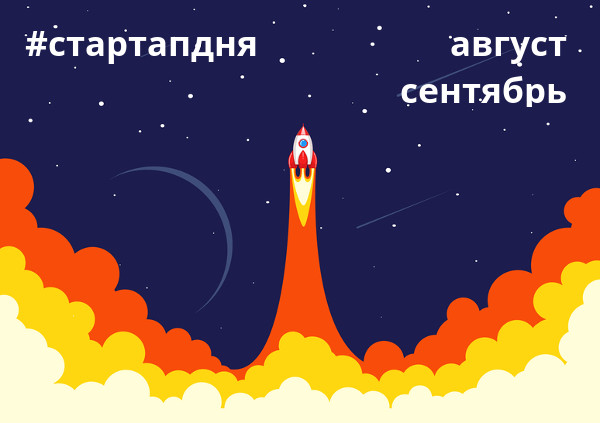
Continuing the “Startup of the Day” series of digests, today I present the most interesting projects for August and September. If you want to get acquainted with the others, then please in my blog. Records are available on Facebook , ICQ and Telegram .
Curve
One of the Important Problems of a modern person is too many bank cards in the wallet: one debit card, where the salary falls, one credit card to live in the grace period, and even bonus cards from which you have to pay in different cases for gifts from the bank. Curve English offers to solve this trouble with another special card, “one ring to rule them all”.
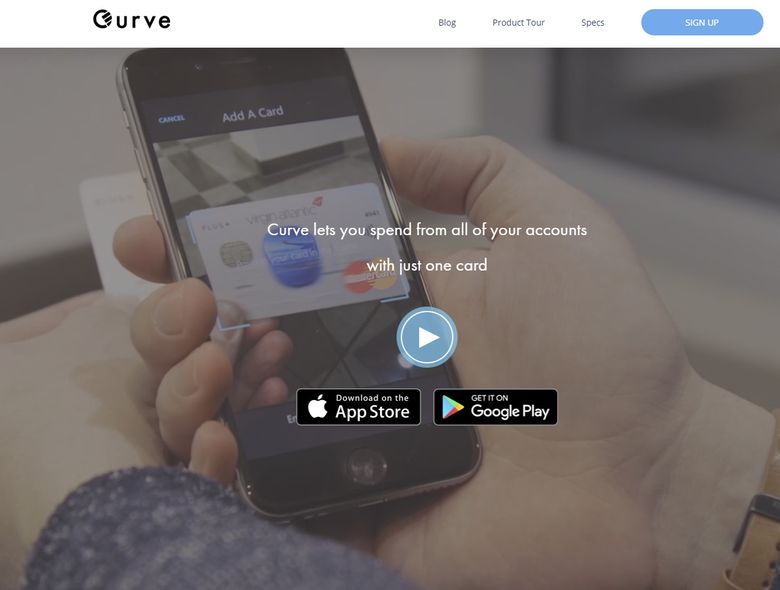
The card is completely ordinary, plastic, not virtual, and comes by mail, and not clicked on the site. But in the mobile application you can connect all your old credit cards to it and indicate which one should be paid in the future. From this point on, it is enough to carry only a new card with you, and payments from it will be transmitted to the one specified in the application, Curve does not have its account. Naturally, the choice of the active payment method can be changed through the application at any time.
Moreover, it is possible to change the card after the transaction, it is given for two weeks. If the user suddenly noticed that the bonus miles did not arrive, he makes a few clicks on the statement, a return is made on the old card, and a new transaction is made.
Curve was launched two years ago, then received $ 3 million in seed investments. In addition to product development, 50 thousand users were found for this money (very well, $ 60 per person, even if you do not take into account everything except marketing): now these are mostly small entrepreneurs, they Curve helps to combine personal and corporate spending. The other day, the startup received the first big round - $ 10 million, promises the support of all European countries and currencies, active marketing and more attention for ordinary hipsters, rather than business users.
Brandless

Imagine a store that does not have Tide, Ariel and dozens of other items, but only “washing powder”? And next to it - "dishwashing detergent", "tea" and "golden rice"? If you make such a store on the Internet, you get Brandless.
The main advantage of nameless goods is that they are cheaper. Household chemicals are, of course, not designer clothes, and the mark-up for the brand does not amount to thousands of percent of the cost in this segment, but advertising is an expensive thing, and the consumer pays for it in the end. As for quality, a startup believes that it can provide it itself, and the millennials are rational enough to believe it. In fact, it turns out that Brandless acts as a brand low-cost carrier and bears all the development costs of its name, but they are harmoniously distributed among the many goods. This is not the case with a traditional brand; Coca-Cola washing powder will not enter the market.
Prices for unnamed products are really low, when compared with counterparts from Instacart - the difference is one and a half times. To emphasize cheapness, Brandless uses the FixPrice approach: everything costs $ 3, sometimes it's packaging, sometimes two, sometimes three, but in any case, psychologically $ 3 is cheap.
The company was founded a year and a half ago; this summer the first big investments came to it - $ 50 million. For this age - a lot, Facebook at the same "age" got 27.5.
Booster
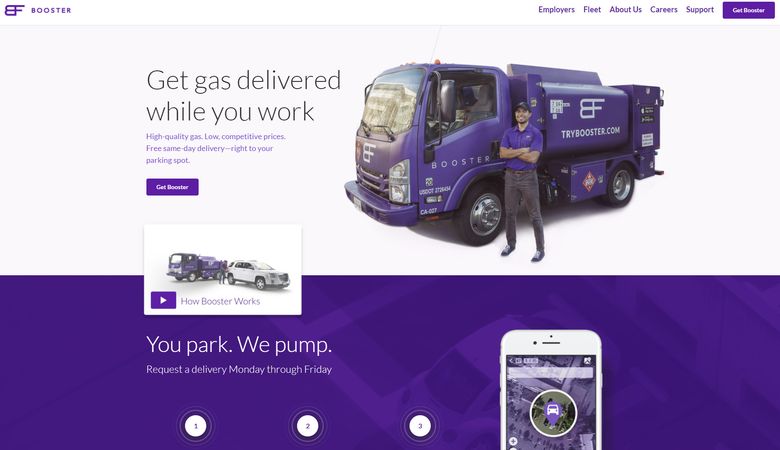
If a startup wants to change the traditional pre-Internet industry, here are two important success factors: niche popularity and service standardization. From this point of view, refueling a car is one of the ideal candidates for transformation: it is super popular and very simple.
Therefore, it is not surprising that many projects are trying to replace the traditional gas station. But the trouble is that the old solution is very effective and cannot easily be replayed. In an “ordinary startup,” a user clicks in a mobile application, a fuel truck arrives at it and fills a parked car, you just need to open the tank in advance.
The only problem is the price. A special truck with a driver spends significant time on each car, and as a result, the client pays for it. It turns out more expensive than at the gas station on the road, so who needs it?
Booster does the same, but with one small caveat: he only drives to the parking lots of large employers from the list of those with whom he has agreed. Of course, this dramatically reduces the cost of delivery: if ten employees ordered gasoline, the gasoline truck will serve them for one trip at a convenient time for themselves, no one will go anywhere on a working day. As a result, prices at Booster are the same as at gas stations, with no extra charges. And this, of course, drastically changes the perception of the user, convenience and time saving become free. In addition, the HR department of the corporation is a free advertising channel, they need to show care for employees, Eychary will surely send out a letter “we agreed with a cool service”.
The startup will soon be three years old, while it works only in the Valley and one district of Texas, raising a little more than $ 30 million, two thirds of them - in the last round this summer. Will expand to new territories.
Dataminr
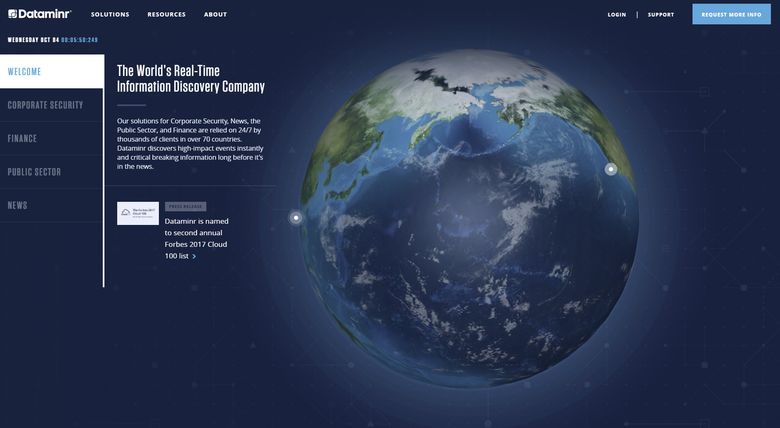
If World War I started now, then the earliest sign of it would be a tweet like “Wow, some shots near the Latin Bridge! I wonder what's up with the Archduke? ”The report of the injury would have passed through the main news agencies in fifteen minutes, if not all, half an hour. This delay has almost no meaning for most of humanity, but there is one important exception - the exchange. Immediately after the publication of such news quotes collapse, and those who read and correctly understand the tweet, will receive time to sell their portfolio at the old, even before the crisis prices, or even shorthair anything and everything.
Dataminr sells access to early information. Deep integration with Twitter and (no joking this time) smart algorithms help him find the tweets of witnesses of something unusual, group them according to the events of the real world and give them to subscribers in a relatively compact form. Well, users get an advantage in time and find out which stocks will fall or rise in half an hour. In the promotional materials, Dataminr talks about his successes in the early detection of several well-known terrorist attacks - and, in principle, for a large fund, even one case is enough to pay back any subscription price. Alas, no one knows the number of false alarms - but they can be very expensive.
In addition to traders, Dataminr services are bought by the media and the state. There was a big scandal with the security services last year, Twitter was outraged by using its data for resale to intelligence and blocked access. Then, apparently, quietly agreed on everything, now on the site Dataminr there is a proposal for state bodies. The company has attracted 180 million dollars of investments in its history, the last round was estimated at 700 million. Interesting shareholders in the project include Twitter and the CIA Venture Fund.
Duolingo
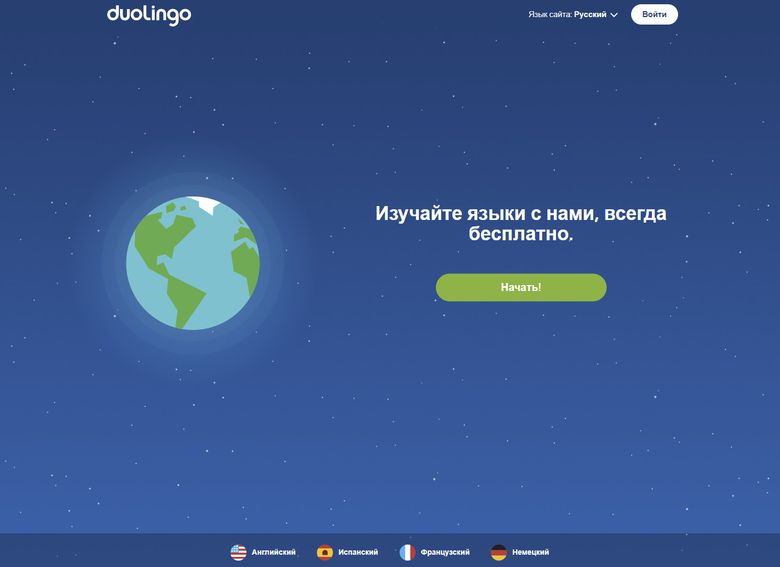
It has long been not a startup, reCAPTCHA was a project with a double bottom. On the surface, webmasters defended sites with complex pictures, and users entered letters to prove that they were humans, not robots. Under the hood - the words recognized by people were used to refine the results of automatic scanning of old books in the library. After selling reCAPTCHA to Google, its founder, Louis Von An, decided to repeat the same focus in a different area and created Duolingo.
For the user, Duolingo is a self-instruction manual for a foreign language, something like our LinguaLeo. “A girl in English will be a girl; choose a picture where a girl is drawn; translate the phrase "I am a girl" ... ", and so 10-15-20 minutes. In theory, after a year of daily exercise, the results will be noticeable. The second bottom was planned to use the results of transfers for commercial purposes. Everything is just like with captcha and books: we take a big document, cut it into 200 sentences, each sentence is included in an exercise for a dozen users, if at least seven results match - this is the correct translation.
The application - a free simulator has quickly become popular: they usually take money for a foreign language, and here it's free: how can one not fly this way? The last time Duolingo boasted 150 million users, on Google Play it has more than 100 million downloads - everything is really good. The trouble came from the commercial: to sell the results of user translations failed. With books from reCAPTCHA it was simpler: the customer initially had a project, arranged his process, he was not looking for alternatives. And Duolingo came out with transfers to an open and supercompetitive market with an infinite number of other suppliers for every taste and budget. In addition, reCAPTCHA had a efficiency of almost 100%, the user always helped a startup to scan the library, and with translations everything is different: a complex phrase can be offered only to the most advanced students, and even then not in every exercise.
As a result, one of the most popular or even the most popular application for learning foreign languages has been eating up investor money for six years, somewhere between $ 15 million and $ 20 million a year, and earns almost nothing. After the failure of ideas with translations, Duolingo turned on advertising, then launched paid tests with certificates, and now introduces in-game currency. And since the training product is essentially free, then only rather strange things are sold for diamonds: for example, for 60 rubles the application will “forget” about skipping one lesson and continue to praise the user for days without a break. People buy this, of course, is negligible, tests are not very popular: everyone needs TOEFL, not Duolingo. But, I repeat, new investors are still regularly, the audience is huge. The next round was this summer, raised $ 25 million at an estimate of 700.
Acorns
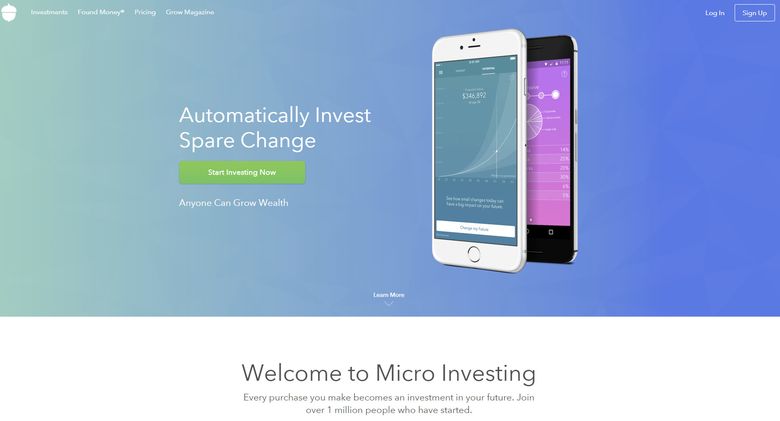
Every American knows that in order to secure old age, you need to buy shares from a young age. But when it comes to practice, willpower is often not enough, and instead of securities, money is spent on entertainment. Acorns helps people outwit their dark side and work on a decent pension.
To start investing, simply download the mobile application and authorize the main bank card in it. Acorns analyzes payments from it and automatically invests in index funds the difference between the real price and round dollars. They bought something for $ 14 and 1 cent - they put off 99 cents, and so every time, for any operation. Psychologically, it does not feel, the user does not infringe upon himself, think - some trifle. But with two non-cash payments per day for a year, 350 bucks accumulate on the investment account - the amount is already tangible.
Of course, Acorns is ready to take regular transfers, you can simply send him any amount or set up a regular replenishment, but the basis of its positioning is investing the change, everything else can offer from fifty services. Two million people have entrusted their cards to the startup, for the year 2017 they have to make a billion payments, which means a billion micro-investments. Acorns charges $ 1 per month for services (surprisingly, not 1.01), or 0.25% of the bill per year if it is over 5,000 dollars; annual revenue, respectively, is about 25 million dollars. The company’s investment in its history has raised almost 100 million.
If you think about localization, then the Russians will not spend money on shares, but the mechanics are interesting, and it will come to us for charity.
')
Source: https://habr.com/ru/post/339680/
All Articles